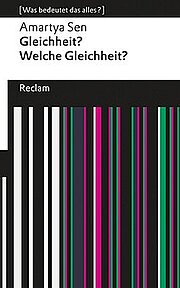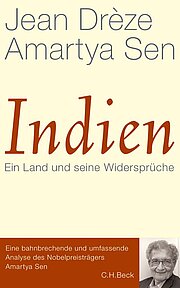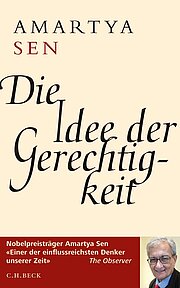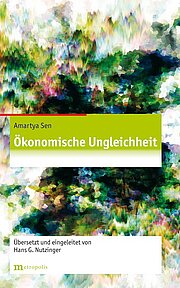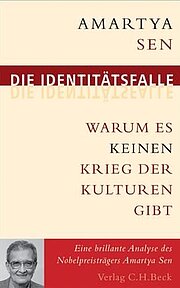The Board of Trustees has chosen the Indian economist and philosopher Amartya Sen as the Peace Prize winner of the Year 2020. The award ceremony took place on Sunday, October 18, 2020, in Frankfurt's Paulskirche. and will be broadcast live on television. The laudatory speech by President Frank-Walter Steinmeier was read by actor Burghart Klaußner.
Statement of the Jury
The German Publishers and Booksellers Association hereby awards the 2020 Peace Prize of the German Book Trade to the economist and philosopher Amartya Sen. In doing so, the association and its members have chosen to pay tribute to a pioneering scholar who has addressed issues of global justice for decades and whose work to combat social inequality in education and healthcare is as relevant today as ever. Among Sen’s most important contributions is the idea of evaluating a society’s wealth not solely based on economic growth indices, but also on the opportunities for development available to all individuals who comprise that society, in particular its weakest members.
Throughout his work, Amartya Sen has consistently highlighted solidarity and a willingness to negotiate as essential democratic values, proving in the process that cultures need not be the source of disputes over identity. His vivid and powerful descriptions have also served to elucidate the fundamental ways in which poverty, hunger and illness are intimately linked to the absence of free and democratic structures. The »Human Development Index«, the »capabilities approach« and the notion of »missing women« are just three of his groundbreaking concepts that continue to set high standards to this day with regard to generating, preserving and evaluating equal opportunities and decent living conditions for all.
Amartya Sen’s inspiring oeuvre represents a compelling call to establish a culture of political decision-making borne by a sense of responsibility for the well-being of others, including the right to self-determination and the right to articulate one’s interests and have a say in one’s own future.
The Award Ceremony
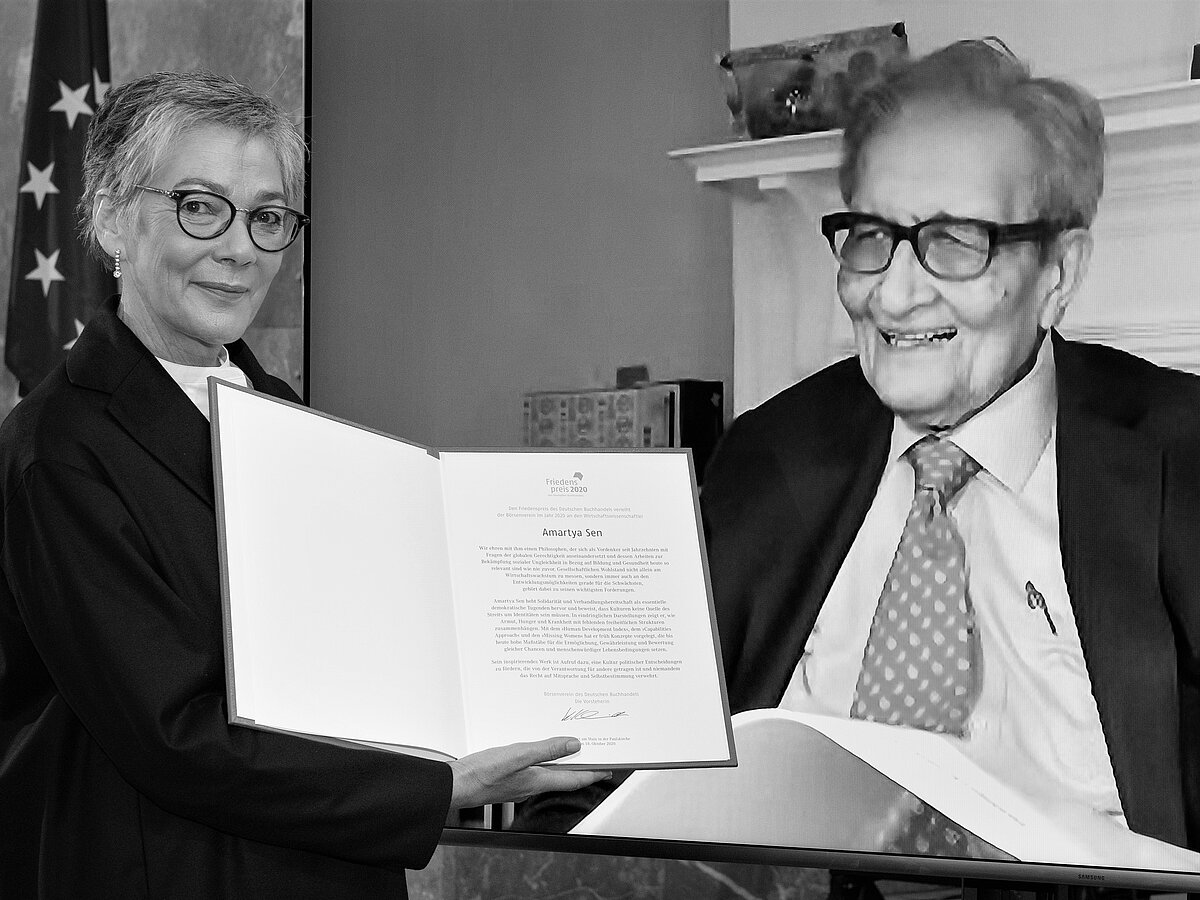
Speeches
Sen revealed himself as a visionary in matters of just distribution, but also as a feminist and a global citizen who gives a stronger voice to the wisdom of the East.
Karin Schmidt-Friderichs - Greeting
Karin Schmidt-Friderichs
Greeting of the Chairperson
in our power to make sure that humankind passes this test of its humanity! For Sen, there can also be no justice without political freedom and no political freedom without democracy. One cannot be had without the other. To him, democracy is therefore also not a luxury that only rich countries can afford, and it is also not just a normative project of the West. It is something that is longed for the world over and a universal promise.
Frank-Walter Steinmeier - Laudation
Frank-Walter Steinmeier
Laudation (read out by Burghart Klaußner)
The world does face today a pandemic of authoritarianism, which debilitates human life in distinct but interrelated ways. Given our global connections and the importance of our shared humanity, there are reasons for us to be seriously concerned not only about our own country, but also about others, taking an interest in problems all over the world.
Amartya Sen - Acceptance Speech
Amartya Sen
Acceptance speech
The freedom of choice gives us the opportunity to decide what we should do. (Amartya Sen,"The Idea of Justice")
Biography
Amartya Kumar Sen was born on 3 November 1933 in Santiniketan, India. He is currently the Thomas W. Lamont University Professor, and professor of economics and philosophy at Harvard University. For many decades, Sen’s multifaceted and award-winning scholarly work has contributed unmatched insights and impulses to a number of fields, including welfare economics, social choice theory, decision theory, studies in hunger and poverty, and development economics. As an economist-philosopher whose research areas include public health and gender studies, he has also worked tirelessly for the cause of democracy, freedom and global justice. In 1998, he was awarded the Nobel Prize for Economics. In 2020, Amartya Sen, one of the most important thinkers of our time, will receive the Peace Prize of the German Book Trade.
Amartya Sen was born into a family of scholars and raised in an environment steeped in tradition. He spent part of his childhood in Dhaka, the present-day capital of Bangladesh, and finished his school education in his hometown of Santiniketan. His early years were influenced by the political movement for independence that took place across India during the 1940s, which was also the time of the conflicts between Hindus and Muslims, as well as that of the great famine in Bengal in 1943.
In 1959, after having completed a B.A. in economics at Presidency College, Kolkata, Sen received his Ph.D. at Trinity College, Cambridge. He continued to devote himself to the study of philosophy in addition to economics, something that is clearly reflected in many of his later works, where issues of economic theory meet moral philosophy and ethics.
In the 1960s, Sen was a guest professor at the Massachusetts Institute of Technology as well as at Stanford, Berkeley and Harvard. After that, he worked as a professor of economics at the University of Delhi’s Delhi School of Economics (1963–1971), the London School of Economics (1971–1977) and Oxford University (1977–1987) as Drummond Professor of Political Economy. From 1988 to 1998, he was the Thomas W. Lamont University Professor, and Professor of economics and philosophy at Harvard, after which he was appointed as Master of Trinity College, Cambridge. In 2004, he returned to Harvard as the Thomas W. Lamont University Professor and Professor of Economics and Philosophy.
*
As an economist-philosopher, Amartya Sen’s thinking is shaped by the question of how social justice can be advanced for all individuals in a society. In exploring these issues, he uses economics, politics and social choice theory.
Sen first became known to a wider public in 1970 for his advancement of the theory of social choice and his analysis of the compatibility of reasoned social decisions and individual rights (»Collective Choice and Social Welfare«, 1970, Expanded Edition, 2017). In 1981, he published his most famous work, »Poverty and Famines – An Essay on Entitlement and Deprivation«. This essay showed definitively that poverty and hunger are caused not only by food shortages, but above all by problems of distribution and a lack of access and entitlements. In addition, Sen showed that famines do not break out in functioning democracies with a free press.
In the 1990s, Sen played a significant role in the development of the Human Development approach of the United Nations, including devising the Human Development Index (HDI) which is an indicator of well-being in countries around the world and takes into account factors such as health and education in addition to average income.
Sen has always worked with his conviction that the quality of an economic system should not be measured solely on the basis of its growth indices, but rather on the opportunities available to the members of society to pursue their own development as well as their freedom to lead a life they have reason to choose (»capability approach«). Among the elements necessary for achieving this, Sen shows are education, healthcare and a free and fair press, in particular. In his 1999 book »Development as Freedom«, he has called for fair sharing of rights and opportunities by women. They also contribute to eliminating global inequalities and improving overall living standards.
Years earlier, in 1990, Sen had already used the idea of “missing women” in an article titled »More Than 100 Million Women Are Missing« published in the New York Review of Books. The term refers to noticeable shortfalls in the number of women in some regions of the world in relation to what may be expected on demographic grounds. This results from neglect of young girls as well as gender-selective abortion of female foetuses, related to »boy preference«, resulting from patriarchal values.
In 2006, the philosopher Sen became involved in the “clash of cultures” debate through his book »Identity and Violence«. In it, he warned of the increasing tendency to reduce individuals to a single identifying characteristic. He described how violence and fundamentalism arise as a result of such narrow construction of identity, and how this tendency fosters conflicts, as well. As an alternative to this approach, Sen made a decisive plea for the active promotion of pluralist understanding.
In 2009, Sen published »The Idea of Justice«, which soon became a bestseller. In that book, Sen examines the theory of justice put forth by John Rawls, criticising it for its ideal-oriented assumptions, which make it unsuitable for application in practical reality. In contrast, Sen proposed a practice-oriented theory and declared democracy to be a basic requirement for social justice.
In 2013, Sen joined with fellow economist Jean Drèze for the book »An Uncertain Glory. India and its Contradictions«, in which they proposed solutions designed to foster a fairer coexistence of peoples in India. Both economists placed the focus of their analysis on the lives and needs of poor and underprivileged populations, portraying the ways in which the introduction of a democratic system influenced Indian’s economy and social fabric, but also showing how the accompanying neglect of social problems has had a serious impact on the country’s economic and political system to this day.
*
Amartya Sen has been the President of the Econometric Society, President of the International Economic Association, President of the Indian Economic Association and President of the American Economic Association. For two years, he was Honorary President of OXFAM and he continues to be active there as an honorary advisor. Sen is a Senior Fellow at the Harvard Society of Fellows, a Fellow of the British Academy, an Honorary Member of the American Academy of Arts and Sciences and a Member of the American Philosophical Society.
Sen has received over 100 honorary doctorates and countless awards for his highly influential work, and his books have been translated into over 30 different languages. He lives in Cambridge, Massachusetts, with his wife, the British-born economic historian Emma Georgina Rothschild, whom he married in 1991 and who is also a professor at Harvard. Amartya Sen has four children, Antara, Nandana, Indrani and Kabir.
The terrible connection between economic poverty and comprehensive unfreedom (even the lack of freedom to live) was a profoundly shocking realization that hit my young mind with overpowering force. (Amartya Sen in "Identity and Violence" about his childhood experience during the clashes between Hindus and Muslims in 1944)
Awards
2020 Peace Prize of the German Book Trade
2019 Bodley Medal, Oxford, UK
2017 Albert O. Hirschman Prize, Institute for Advanced Study
2017 Johan Skytte Prize in Political Science, Oslo, Norway
2016 Social Progress Medal, France
2015 Honorary Member of the Japan Academy
2015 John Maynard Keynes Prize, U.K.
2014 Domingo Faustino Sarmiento Award, Argentina
2013 Commandeur de la Legion d'Honneur, France
2012 Order of the Aztec Eagle, Mexico
2011 National Humanities Medal, U.S.A.
2009 Honorary Member of the Royal Irish Academy
2007 Meister Eckhart Prize, Germany
2007 United Nations Lifetime Achievement Award, ESCAP
2007 Global Economy Prize, Kiel, Germany
2005 Barnard College Medal of Distinction, U.S.A.
2005 Silver Banner, Florence, Italy
2004 Lifetime Achievement Award by the Indian Chamber of Commerce
2001 Bruno Kreisky Prize for Political Book of the Year
2000 Brazilian Ordemdo Merito Cientifico, Grã-Cruz
2000 Leontief Prize, U.S.A.
2000 Eisenhower Medal, U.S.A.
2000 Honorary Companion of Honour, U.K.
1999 Honorary Citizenship of Bangladesh
1999 Bharat Ratna, India
1998 Alfred Nobel Memorial Prize in Economic Sciences
1997 Edinburgh Medal, U.K.
1997 Catalonia International Prize
1993 Jean Mayer Global Citizenship Award
1990 Giovanni Agnelli International Prize in Ethics, Italy
1990 Alan Shawn Feinstein World Hunger Award
1981 Foreign Honorary Member of the American Academy of Arts and Sciences
Nothing, arguably, is as important today in the political economy of development as adequate recognition of political, economic appreciation of political, economic and social participation and leadership of women. (Amartya Sen in "Development as Freedom.")
Bibliography
Gleichheit? Welche Gleichheit?
[orig. »Equality of What?« (1979)], Übersetzt und herausgegeben von Ute Kruse-Ebeling, Deutsche Erstausgabe, Reclam Verlag, Stuttgart 2019, Kartoniert, 72 Seiten, ISBN 9783150196144, 6,00 €
Indien. Ein Land und seine Widersprüche
[orig. »An Uncertain Glory. India and its Contradictions« (2013)], von Amartya Sen und Jean Dreze, übersetzt von Thomas Atzert und Andreas Wirthensohn, C.H. Beck Verlag, München 2014, Gebunden, 376 Seiten, ISBN 9783406670299, 29,95 €
Die Idee der Gerechtigkeit
[orig. »The Idea of Justice« (2009)], Übersetzt von Christa Krüger, C.H. Beck Verlag, München 2010, Gebunden, 493 Seiten, ISBN 9783406606533, 29,95 € (dtv, München 2017, 14,90 €)
Ökonomische Ungleichheit
[orig. »On Economic Inequality« (1973)], Übersetzt von Hans G. Nutzinger, Metropolis-Verlag, Marburg 2009, Broschiert, 142 Seiten, ISBN 978-3-7316-1264-3, 19,80 € (Campus-Verlag, Frankfurt/New York 1975)
Die Identitätsfalle. Warum es keinen Krieg der Kulturen gibt
[orig. »Identity and Violence. The Illusion of Destiny« (2006)], Übersetzt von Friedrich Griese, C.H. Beck Verlag, München 2007, Gebunden, 208 Seiten, ISBN 9783406558122, 19,90 € (dtv, München 2010)
»Collective Choice and Social Welfare. Expanded Edition«
Penguin, London 2017.
The Country of First Boys. And Other Essays
Oxford University Press, Oxford 2015
The Arrow Impossibility Theorem
Edited by Eric S. Maskin and Amartya Sen. Columbia University Press, New York 2014
Peace and Democratic Society
Edited by Amartya Sen, Open Book Publishers, Cambridge, UK 2011
Mismeasuring Our Lives. Why GDP Doesn’t Add Up
With Joseph E. Stiglitz and Jean-Paul, The New Press, New York 2010
Markets, money and capital. Hicksian economics for the twenty-first century
Edited by Amartya Sen, Stefano Zamagni, Roberto, Cambridge University Press, Cambridge, UK/New York 2008
The Argumentative Indian. Writings on Indian History, Culture, and Identity
Farrar, Straus and Giroux, New York 2005
Handbook of social choice and welfare
Edited by Amartya Sen, Kōtarō Suzumura, Kenneth J. Arrow, Elsevier, Amsterdam/Boston 2002.
Ökonomie für den Menschen. Wege zu Gerechtigkeit und Solidarität in der Marktwirtschaft
[orig. »Development as Freedom« (1999)], Übersetzt von Christiana Goldmann, Carl Hanser Verlag, München 2000 (dtv, München 2002)
India. Development and Participation
With Jean Drèze, Oxford University Press, Oxford 2002.
Rationality and Freedom
Harvard University Press, Cambridge, MA 2002.
Indian Development. Selected Regional Perspectives
Edited with Jean Drèze, Oxford University Press, Delhi 1997.
India: Economic Development and Social Opportunity
With Jean Drèze. Clarendon Press, Oxford 1995.
The Quality of Life
Edited with Martha Nussbaum, Clarendon Press, Oxford 1993.
Inequality Reexamined
Clarendon Press, Oxford 1992.
The Political Economy of Hunger (in 3 volumes)
Edited with Jean Drèze, Clarendon Press, Oxford 1990 and 1991.
Hunger and Public Action
With Jean Drèze, Clarendon Press, Oxford 1989.
On Ethics and Economics
Basil Blackwell, Oxford and New York 1987.
Der Lebensstandard
[orig. »The Standard of Living« (1987)], Übersetzt von Ilse Utz, Rotbuch Verlag, Hamburg 2000.
Commodities and Capabilities
North-Holland, Amsterdam 1985.
Resources, Values and Development
Basil Blackwell, Oxford 1984.
Choice, Welfare and Measurement
Basil Blackwell, Oxford 1982.
Utilitarianism and Beyond
Edited with Bernard Williams, Cambridge University Press, Cambridge 1982.
Poverty and Famines. An Essay on Entitlement and Deprivation
Clarendon Press, Oxford 198l.
Employment, Technology, and Development
Clarendon Press, Oxford 1975.
On Economic Inequality
Clarendon Press, Oxford 1973.
Guidelines for Project Evaluation
with Partha Dasgupta and Stephen Marglin, UNIDO, United Nations, New York 1972.
Collective Choice and Social Welfare
Holden Day, San Francisco 1970.
Choice of Techniques
Basil Blackwell, Oxford 1960.
Growth Economics
Penguin Books, Harmondsworth 1960.
Laudation Frank-Walter Steinmeier
Frank-Walter Steinmeier was born in Detmold in 1956 and has served as the 12th President of the Federal Republic of Germany since March 2017. He received his doctorate in public law and political science in 1991 and was named head of the Federal Chancellery in 1999. From 2005 to 2009, he held the office of Federal Minister of Foreign Affairs and, starting in 2007, was also Vice-Chancellor of Germany. Two years after that, he was voted into the Bundestag via direct mandate and elected chairman of the SPD parliamentary group. From 2013, he acted once again as Foreign Affairs Minister until his election to the office of Federal President in 2017.
Throughout his career, Steinmeier has continually fostered a robust dialogue between politics and culture. For example, as a long-time passionate reader, he has remained very much connected to literature and the arts in his role as German president. His key overall concerns include securing liberal democracy, fortifying democratic and social cohesion and strengthening international cooperation. In his role as Federal President, he is also the patron of the “Vorlesewettbewerb des Deutschen Buchhandels”, the nationwide reading competition for young people launched by the German Publishers and Booksellers Association.
Steinmeier has received several awards for his work to date, including the Ignatz Bubis Prize, the European Prize for Political Culture and the Willy Brandt Prize.
